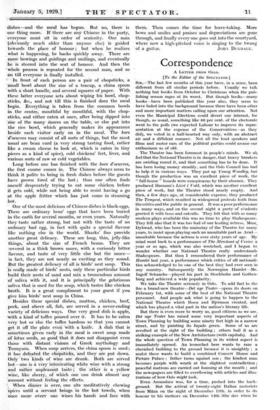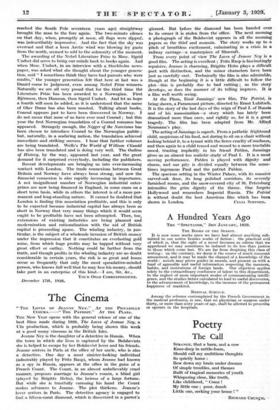Correspondence
A LETTER FROM OSLO.
[To the Editor of the SPECTATOR.
Sia,—The last few months of this year have, in a sense, been different from all similar periods before. Usually we talk nothing but books from October to Christmas when the pub- lishing season rages at its worst. But though books—many books—have been published this year also, they seem to have faded into the background because there have been other and more important matters calling upon our attention. Not even the Municipal Elections could divert our interest, for though, as usual, something. like 80 per cent. of the electorate ,went to the polls (we expected Labour to improve its repre- sentation at the expense of the Conservatives—as they did), we voted in a half-hearted way only, with an abstract air and a diffident manner. Not all the loud speakers and films and motor cars of the political parties could arouse our enthusiasm as of old.
The Theatre has been foremost in people's minds. We all feel that the National Theatre is in danger, that heavy breakers are swirling round it, and that something has to be done. It has been losing money steadily, and the Oslo Council has had to help it in various ways. They put up Young Woodley, but though the production was an excellent piece of work, the " full-house " boards were conspicuous by their absence. They produced Hamsun's Livet i Vold, which was another excellent piece of work, but the Theatre stood nearly empty. And then, a few days ago, at considerable expense, they produced The Tempest, which resulted in widespread protests both from the critics and the public in general. It was a poor performance in many ways, and on the second night a party of students greeted it with boos and catcalls. They felt that with so many modern plays available this was no time to play Shakespeare. They felt also that it was too bad of our leading actress, Mme, Dybwad, who has been the mainstay of the Theatre for many years, to insist upon playing such an unsuitable part as Ariel- unsuitable because the actress is over sixty years of age. My mind went back to a performance of The Merchant of Venice a year or so ago, which was also wretched, and I began to wonder whether our National Theatre really understands Shakespeare. But then I remembered their performance of Hamlet last year, a performance which critics of all nationali- ties acknowledged to be one of the best they had everseen in any country. Subsequently the Norwegian Hamlet—Mr. Ingolf Schanche—played his ,part in Stockholm and Gothen- burg and achieved a wide popularity.
We take the Theatre seriously in Oslo. To add fuel to the fire a. brand-new theatre—Del nye Teater—opens its doors on February 1st, with some of the best of the National Theatre personnel. And people ask what is going to happen to the National Theatre which Ibsen and Bjornson created, and which has played .a vital part in the nation's literary life.
But there is even more to worry us, good citizens as we are. Del nye Teater has raised some very important aspects of Town` Planning by building some ninety feet high in a narrow street, and by painting its facade green. Some of us are revolted at the sight of the building ; others hail it as a striking example of the New Architecture (with capitals). And the whole question of Town Planning in its widest aspect is immediately opened. An iconoclast here wants to raze a cherished building to the ground because it is unsightly ; a zealot there wants to build a' combined Concert House and Piettre Palace ; "father turns against son ; the kindest man becomes purple with wrath at the slightest contradiction ; peaceful matrons are carried out foaming at the mouth ; and the newspapers are filled to overflowing with articles and illus- trations of how Oslo might look.
Even Amundsen was, for a time, pushed into the back- ground. But the arrival of twenty-eight Italian motorists from-Milan on the night of December 11th, in order to 'do 'honour to ineihory on December 14th --(the day when he
reached the South Pole seventeen years ago) straightway brought the man to the fore again. The two-minute silence on that day, when, promptly at noon, all flags were dipped. was indescribably impressive. And the fact that the sky was overcast and that a keen Arctic wind was blowing icy gusts from the north, seemed to add to the solemnity of the moment.
The awarding of the Nobel Literature Prize to Mme. Sigrid Undset did serve to bring our minds back to books again. And when Mme. ,Undset, in an interview with a Stockholm news- paper, was asked what she thought about the younger genera- tion, said " I sometimes think they have had parents who were misfits," the younger generation felt that here at last was a Daniel come to judgment, even among Nobel Prize winners. Naturally we are all very proud that for the third time the Literature Prize has been awarded to a Norwegian. First Bjornson, then Hamsun, then Sigrid Undset. And let us hope a fourth will soon be added, as it is understood that the name of Olav Duun has also been mooted. Talking about books, Conrad appears just to have been discovered in Norway. I do not mean that none of us have ever read Conrad ; but this year the first Norwegian translation of a Conrad romance has appeared. Strangely enough, the Nigger of the Narcissus has been chosen to introduce Conrad to the Norwegian public.; but, naturally, in a seafaring nation, the translation achieved immediate and striking success. I hear that further volumes are being translated. Wells's The World of William Clissold has also been translated and is doing very well. The Outline of History, by the way, appeared last year, and the great demand for it surprised everybody, including the publishers.
Recent developments are bringing us into ever-increasing contact with London. The trade connexions between Great Britain and Norway have always been strong, and now the financial connexion is also rapidly increasing in importance. A not insignificant number of Norwegian industrial enter- prizes are now being financed in England, in some cases on a short term basis, while in others the interest is of a more per- manent and long-standing nature. It cannot be doubted that London is finding this association profitable, and this is only to be expected because industrial capital has always been so short in Norway that very many things which it would seem ought to be profitable have not been attempted. Then, too, extensions of existing industries are being planned and modernization and rationalization with the aid of British capital is proceeding apace. The whaling industry, in par- ticular, is the subject of a wholesale invasion of British money under the impression that it constitutes an everlasting gold mine, from which huge profits may be tapped without very great effort or outlay. Nothing could be further from the truth, and though profits in the whaling industry are no doubt considerable in certain years, the risk is so great and losses occur so frequently that only the most speculative-minded person, who knows full well that he may lose his money, should take part in an enterprise of this kind.—I am, Sir, &c.,







































 Previous page
Previous page